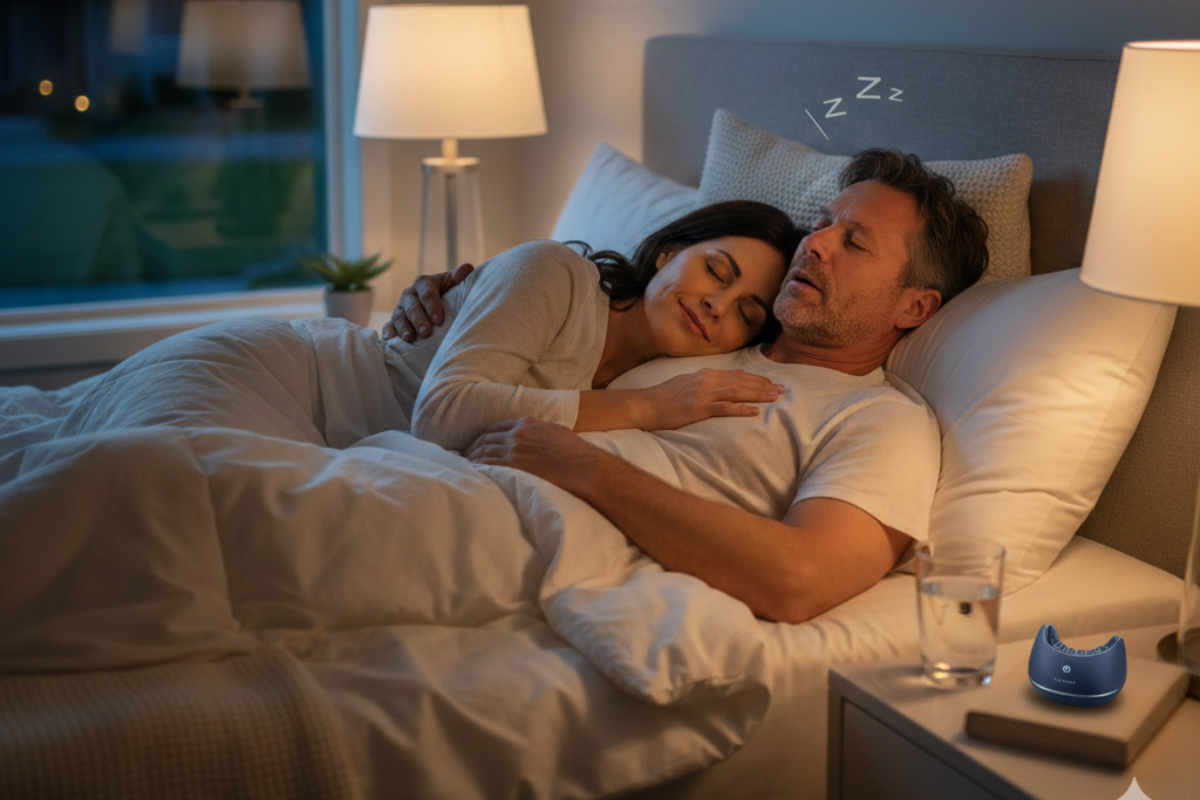Free Shipping - On Orders Over $99 (USA, Canada, UK, & AU)

How is snoring affecting your relationship?
January 27, 2020 2 min read
Is snoring affecting your relationship? If you’re nodding your head, just know that it’s more common than you think. According to the National Sleep Foundation, about 26% of couples say they lose sleep because of their partner’s sleep problems. Couples will often joke about snoring, but they sometimes ignore the serious effects it has on their relationship.
From the National Sleep Foundation study, 31% of couples affected by snoring sleep in different rooms. The idea of sleeping in separate rooms seems to be a norm that most couples are willing to accept. However, this has been proven to lead to increased tension in the relationship.
In an article from The Sun, an interviewed couple reveals that snoring is “embarrassing and definitely not at all sexy”. They further go on to note that spontaneous sex decreases simply due to the fact that they don’t sleep beside each other. Sleeping in separate rooms should be a last case scenario option, but often seems like the easiest solution.
Snoring can even tarnish your time together during the day. Partners who have poor sleep quality will often have different sleep and wake schedules. If the snoring interrupts your significant other’s ability to have a good night’s rest, they will most likely be tossing and turning for a significant portion of their shut-eye. In some cases, both partners may choose different sleep times, just so they could rest more. As a result, heavy frustration, resentment, and general tiredness can lead to constant blame on the snorer and vice versa.
In some long-term snoring affected relationships, hearing loss is a serious issue that could arise. In a pilot study that was conducted, those who had been involved in snoring-struck romantic relationships for at least 15 years had significant hearing loss in the one ear (closest to the snoring).
When it comes to living with a snorer, early communication is key. Seeking advice from a doctor is always a good idea, or if you want to find quick and effective solutions, try over-the-counter products such as the clinically proven Good Morning Snore Solution Mouthpiece.
Snoring doesn’t have to be a burden on you or your partner. Acknowledge the problem, communicate, and be open to solutions that have worked for others!
References
- https://www.sleepfoundation.org/sites/default/files/inline-files/2005_summary_of_findings.pdf#page=31
- https://www.thesun.co.uk/fabulous/4639767/snoring-relationship-partner-dating-ruined/
- https://www.psychologytoday.com/ca/blog/sleep-newzzz/201412/how-keep-snoring-hurting-your-relationship
- https://well.blogs.nytimes.com/2009/06/11/sleeping-with-a-snorer/
- https://www.reddit.com/r/relationship_advice/comments/abtgxy/married_couples_with_a_snoring_partner_have_you/
Also in Blog

Healthy Sleep Goals For 2026
December 22, 2025 6 min read

💨 Are Your Nighttime Breathing Issues Robbing You of Your Health and Your Energy?
December 12, 2025 3 min read
Breathing issues during sleep, collectively known as sleep-disordered breathing, are a major public health concern.

Is Your Snoring a Sign of Something More Serious? Unpacking the Science of Sleep
December 05, 2025 3 min read
When you snore, what's actually happening?
Join our Insiders Club
Every week you will receive specials, discounts, and giveaways.
Categories
- Better Sleep
- depression
- Fitness
- funny animal
- Global Citizenship
- health
- Mental Health
- mouthpiece
- nutrition
- pillow
- Productivity
- relationships
- sleep
- sleep apnea
- sleep deprivation
- Sleep Tech
- snoring
- snoring humor
- snoring jokes
- snoring sounds
- stop snoring
- StopSnoringStartLiving
- technology
- Tongue displacement
- travel
- video
- Young Adult

